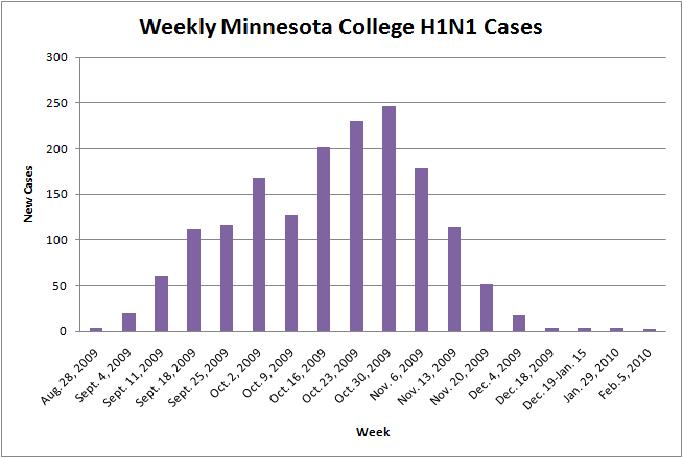
Last fall, the St. Thomas campus was buzzing about H1N1, hand sanitizer was flying off the shelves at the C-Store, and students and staff were taking extra precautions to prevent further spread of the illness.
So far this winter, the H1N1 buzz has quieted, with students and staff speaking less of the illness. Is it possible the H1N1 epidemic has run its course?
While federal health officials are not ready to declare the H1N1 threat as part of the past, they reported Feb. 12 that U.S. cases have been declining since late October. This is also true globally.
Madonna McDermott, director of Student Health Services and the Wellness Center, said there have been 520 suspected cases of H1N1 at St. Thomas since the outbreak last fall.
“It is our hope that we have seen the worst of H1N1 as if it is a part of our past, but nobody knows for sure what is going to happen with it,” McDermott said.
Some U.S. experts believe there are many reasons not to be concerned about another wave of H1N1 this spring because the virus has shown no sign of mutation and the vaccine has been effective. Still, others think there is a chance H1N1 cases will peak between late spring and early fall.
Several students, such as sophomore Tyler Petersen, think there is a possibility that H1N1 cases will peak again, causing students and staff to become extremely cautious about their sanitary decisions.
“I think it’s made us more paranoid about illness,” Petersen said. “We have a H1N1 statement in each of our syllabuses, and there is electronic hand sanitizer everywhere, but we’re the U.S., and we deal with anything that happens.”
Other students, such as sophomore Kelli Hanson, feel H1N1 is becoming a part of the past.
“I think this is it for the H1N1 epidemic because it seems to be weaning off and you hear people talking about it less and less,” Hanson said.
An estimated 70 million Americans have been vaccinated against H1N1 through a government campaign that began in October. Of those vaccinations, 992 were given by Student Health Services at St. Thomas.
“Flu vaccinations went fast this year, both H1N1 and seasonal, and I think that maybe that is why we haven’t seen very many cases of the seasonal flu this year,” McDermott said. “With the impact H1N1 has had, we still have a lot more vaccines to give, if students and staff are interested.”
Although nobody is sure what H1N1 is going to do, McDermott said along with the H1N1 vaccinations still available, H1N1 forms will remain online until they are certain the illness is gone.
Ashley Stewart can be reached at stew1177@stthomas.edu.
